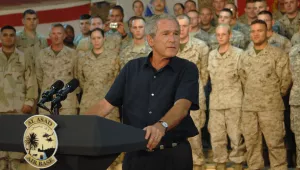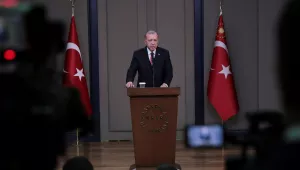Rather than wondering what we should do about ISIS, we should be asking another question: What should we do about extremism? ISIS is just one face of a far larger, more unwieldy, more complicated, and more devastating adversary. Defeat ISIS militarily without extirpating extremist ideology, and you might feel like you’ve accomplished something. Soon, though, you’ll be asking what to do about the next group that espouses extremist ideology. And the next one after that.
Most analysts recognize that extremist ideology has played a role in the rise of ISIS, but they attribute the group’s advent to other factors—failed states in the Middle East, the centuries-old conflict between Shia and Sunnis, the technology that allows ISIS’s message to spread.
In fact, the rise of ISIS originates in a crisis of identity. From America to Zanzibar, millennials have experienced a post-9 / 11 world that they find unfamiliar and unsettling. They’ve asked questions about what it means to be modern and Muslim, and how the two might be reconciled. They’ve also struggled over the difference between culture and religion. Recognizing this, the bad guys have created a reassuring ideology built on emotion and belonging. Their narrative pits a monolithic Muslim “us” against a non-Muslim “them,” validating and valorizing the “us” under the veil of religion and purpose. Confronted by this narrative, some Muslim millennials see martyrdom as an attractive job description. Others simply support the extremist team by sporting the bumper sticker, wearing the colors; they’ll alter the cultural landscape so that everyone around them accepts extremism as the norm.
Yes, we’re waging a military war against ISIS—a war we must win. But ISIS can’t have an army if it lacks recruits. Behind its growing physical army is a virtual army. A viable long-term strategy will devote itself to vanquishing both armies by countering the spread of the underlying ideology. We must knit hard and soft power together, funding them both properly and giving the ideological elements as much respect as the kinetic ones.
In every way, through word and deed, U.S. policy has to contest the extremists’ monolithic image of Islam. That means connecting the dots from central Asia to Africa to South America and engaging the threat globally, not just in the Middle East. It means confronting the Gulf states that for decades have nurtured extremist narratives globally. Recognizing that this is a millennial problem, we must study the demographics of digital natives, create grassroots programs (including counternarratives and movements), and give them room to grow. The United States can provide seed money to projects proposed by local youth, while also scaling up programs already created or supported by the U.S. government, including Generation Change, a network of 500 millennial change agents in 30 countries around the world, and Against Violent Extremism, the world’s only network of former extremists. Other promising tactics include teen hotlines and mental-health resources in local communities; a Countering Violent Extremism youth lab (modeled after the MIT Media Lab); interactive educational programs for parents and youth; peer-to-peer videos, games, and forums; and partnerships with local organizations and global institutions to protect ancient art, manuscripts, and architecture from extremists.
If we focus on ISIS as the main enemy, we’re playing an endless game of whack-a-mole. Tackle extremist ideology inventively and experimentally, and we make possible a more comprehensive and durable solution. We shouldn’t underestimate what we can achieve by applying technology and know-how from multiple sectors, including business. We also shouldn’t underestimate the latent distaste of Muslim youth themselves for extremism. If you spend time on the ground talking to Muslim youth, as I have in more than 80 countries, you realize that nobody wants foreign ideology out of their neighborhoods more than they do. They yearn for a different world. We should start acting like we do as well.
For the original publication of this article by National Journal, click here.
Pandith, Farah. “Engage Muslim Millennials.” The National Journal, June 13, 2015





